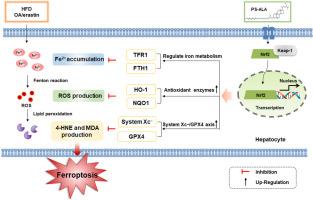α-亚麻酸植物甾醇酯通过激活Nrf2信号通路防止代谢功能障碍相关的脂肪肝疾病中的铁凋亡。
IF 4.9
2区 医学
Q1 BIOCHEMISTRY & MOLECULAR BIOLOGY
引用次数: 0
摘要
越来越多的证据表明,铁下垂有助于代谢功能障碍相关脂肪性肝病(MAFLD)的发生和发展。本研究旨在探讨植物甾醇酯α-亚麻酸(PS-ALA)对肝细胞铁凋亡的改善作用,并进一步阐明其分子机制,重点关注Nrf2信号的调控。我们发现,在喂食高脂肪饮食的小鼠和油酸/erastin诱导的HepG2细胞中,PS-ALA改善了肝脏铁超载,减少了ROS的产生和脂质过氧化物(MDA和4-HNE)的产生。此外,我们的数据显示,PS-ALA能够通过减少PI染色阳性细胞,增强SLC7A11/GPX4抗氧化系统以及降低催化脂质过氧化的关键酶(ACSL4, ALOX5ap和PTGS2)的蛋白表达来证明其对铁死亡的保护能力。在机制上,PS-ALA促进Nrf2的核易位,增强HO-1和NQO1的蛋白表达。siRNA沉默Nrf2后,PS-ALA对铁下垂的保护作用明显减弱。我们的研究结果表明,通过激活Nrf2信号通路抑制铁下垂参与了PS-ALA对MAFLD的保护作用,并强调了PS-ALA作为MAFLD预防和治疗策略的潜力。本文章由计算机程序翻译,如有差异,请以英文原文为准。

Plant sterol ester of α-linolenic acid protects against ferroptosis in metabolic dysfunction-associated fatty liver disease via activating the Nrf2 signaling pathway
Increasing evidence indicates that ferroptosis contributes to the occurrence and development of metabolic dysfunction-associated fatty liver disease (MAFLD). This study aimed to investigate the improvement effect of plant sterol ester of α-linolenic acid (PS-ALA) on ferroptosis in hepatocytes and further elucidate the underlying molecular mechanism, focusing on the regulation of Nrf2 signaling. We found that PS-ALA ameliorated liver iron overload and reduced ROS generation and lipid peroxides (MDA and 4-HNE) production both in mice fed a high-fat diet and HepG2 cells induced by oleic acid/erastin. In addition, our data revealed the ability of PS-ALA to protect against ferroptosis as evidenced by diminished PI staining positive cells, enhanced SLC7A11/GPX4 antioxidant system, and decreased protein expression of the key enzymes catalyzing lipid peroxidation (ACSL4, ALOX5ap, and PTGS2). Mechanistically, PS-ALA promoted the nuclear translocation of Nrf2 and enhanced the protein expression of HO-1 and NQO1. Silence of Nrf2 by siRNA markedly weakened the protected effect of PS-ALA on ferroptosis. Our findings indicate that inhibition of ferroptosis via activating the Nrf2 signal pathway is involved in the protective role of PS-ALA on MAFLD and highlight the potential of PS-ALA as a prevention and treatment strategy for MAFLD.
求助全文
通过发布文献求助,成功后即可免费获取论文全文。
去求助
来源期刊

Journal of Nutritional Biochemistry
医学-生化与分子生物学
CiteScore
9.50
自引率
3.60%
发文量
237
审稿时长
68 days
期刊介绍:
Devoted to advancements in nutritional sciences, The Journal of Nutritional Biochemistry presents experimental nutrition research as it relates to: biochemistry, molecular biology, toxicology, or physiology.
Rigorous reviews by an international editorial board of distinguished scientists ensure publication of the most current and key research being conducted in nutrition at the cellular, animal and human level. In addition to its monthly features of critical reviews and research articles, The Journal of Nutritional Biochemistry also periodically publishes emerging issues, experimental methods, and other types of articles.
 求助内容:
求助内容: 应助结果提醒方式:
应助结果提醒方式:


